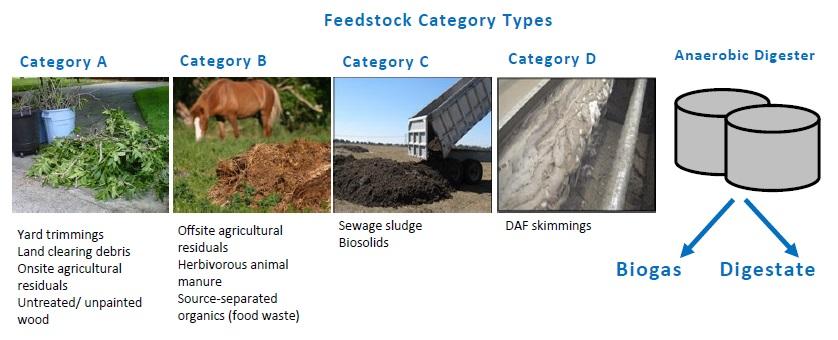
Anaerobic Digestion
Anaerobic Digestion
Anaerobic digestion is the controlled decomposition of organic materials under anaerobic conditions in an anaerobic digester to produce biogas and digestate. Anaerobic digestion happens in closed spaces where there is no air, like in a vessel called an anaerobic digester.
Biogas is the gas created by anaerobic digestion. Biogas is mostly methane (CH4) and carbon dioxide (CO2), with very small amounts of water vapor and other gases. The carbon dioxide and other gases can be removed, leaving only the methane. Methane is the primary component of natural gas. Biogas is a renewable energy source that can be used in variety ways, such as to fuel engines and supply homes and businesses through the natural gas pipeline.
Digestate is the residual solids or liquids remaining after organic material has been processed in an anaerobic digester. Digestate is rich in nutrients and can be used as animal bedding, fertilizer, and solid amendment. Digestate is also a foundation material for bio-based products such as bioplastics.
What is an anaerobic digester?
An anaerobic digester is an enclosed vessel that processes organic material under anaerobic conditions to produce biogas and digestate.
What is the difference between anaerobic digestion and composting?
Anaerobic digestion is a type of composting which occurs without the presence of air. Composting is the controlled biological decomposition of organic matter into a stable, odor free humus. For more details on composting, visit our Composting page.
I want to build an anaerobic digestion facility in Georgia. Where should I begin?
The Georgia Rules for Solid Waste Management describe the solid waste permitting and operational requirements for anaerobic digestion operations in Georgia. See Chapter 391.3.4-16 of the Georgia Rules for Solid Waste Management for details on the type of solid waste permit required, exemptions, feedstock categories, and classes.
Additional EPD permits may be required depending on the nature of your project. Please see details in the section below regarding contact information for other EPD Branches/Programs.
What is anaerobic digestion feedstock and how do I know if I need a permit?
Feedstock is any organic material used in the production of mulch or compost or processed in an anaerobic digester. Feedstock is further broken into specific categories according to Chapter 391-4-4.16(4) the Georgia Rules for Solid Waste Management.
AD Feedstock.jpg

See:
Guidance
on Georgia’s Rules for Solid Waste Management - Anaerobic Digestion (PDF)
for additional details of feedstock categories and examples.
Anaerobic digestion facilities are classified as Class 6 In-Vessel Composting and are regulated by the rules found in Chapter 391-3-4-.16(5)(f) of the Georgia Rules for Solid Waste Management.
Class 6 facilities are required to obtain a Solid Waste Handling permit according to Chapter 391-3-4-.16(1) in the Georgia Rules for Solid Waste Management. These facilities use in-vessel processing for anaerobic digestion to process category A, B, C, and/or D feedstock.
Additionally, facilities must comply with the following:
- Class 6 Design and Operating Standards, see Chapter 391-3-4-.16(5)(f)
- Siting Criteria, see Chapter 391-3-4-.16(6)(b)
Permit exemptions: Anaerobic digestion facilities that are permitted in accordance with the Georgia Rules for Water Quality Control are exempt from Solid Waste Handling Permits. These include:
- Facilities located at a wastewater treatment plants
- On-farm anaerobic digesters or lagoons
See the Georgia Rules for Solid Waste Management (391-3-4.16(3)(a) for more information.
For questions on Solid Waste Handling permits for anaerobic digestion, please contact:
| Contact | EPD Branch/Program | Phone Number | Email Address |
| Sarah Knapp, Manager | Land Protection/Recovered Materials | (470) 524-0632 | [email protected] |
| Richard Posey, Engineer | Land Protection/Recovered Materials | (470) 604-7137 | [email protected] |
Do I need additional permits?
Every project is unique and may require additional permits. It is recommended that you contact representatives in other EPD branches and programs and review your project plans to determine if other permits are needed.
It is also advised to reach out to the local jurisdiction for zoning approval and compliance with the Regional Solid Waste Management Plan.
Who should I contact for questions on additional permits or requirements?
Below is the contact information for representatives in other EPD branches and programs who can provide guidance to help you determine if your project requires additional permits:
| Contact | EPD Branch/Program | Phone Number | Email Address |
| Steve Allison, Manager | Air Protection/ Stationary Source Permitting Program | (470) 938-3360 | [email protected] |
| Vacant | Watershed Protection/ Nonpoint Source Program | TBD | TBD |
| Kelli-Ann Schrage, Manager | Watershed Protection/ Wastewater Regulatory Program | (470) 607-3078 | [email protected] |
Am I required to submit annual reporting?
No, operators of anaerobic digester (class 6) facilities are not required to submit annual reporting to EPD; however, they are encouraged to do so in an effort to better capture landfill diversion activities for organics in the state.
Operators of anaerobic digester facilities may use the
Annual
Compost and Digestate Tonnage Report
to voluntarily report the weight or volume (in tons or cubic yards) of feedstocks and gas and digestate produced and beneficially reused in the previous fiscal year (July 1 through June 30).
The completed voluntary report and any questions can be emailed to [email protected]. The report should be submitted no later than September 1 for the previous fiscal year (July 1 – June 30). Operators may also submit data from previous years.
Ready to apply?
Additional Resources
- EPA's Resources for Anaerobic Digestion - U.S. EPA
- EPA AgSTAR Biogas Recovery - U.S. EPA
- 2021 EPA Anaerobic Digestion Funding Opportunity - U.S. EPA
- Georgia Rules for Solid Waste Management Rules Chapter 391-3-4-.16 - Georgia Rules
-
Guidance on Georgia’s Rules for Solid Waste Management - Anaerobic Digestion (PDF)
- GA EPD’s Watershed Protection Branch - Georgia EPD
- Composting - Georgia EPD